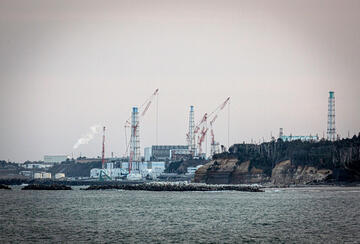
A three-person team from CISAC toured the only domestic mine producing rare earths, which are critical for the modern economy.

As the tragedy in Ukraine unfolds before the world with each day darker than the next, Russian saber rattling with nuclear weapons is only a part of the nuclear concern.

A former deputy secretary-general at NATO argues that the alliance is far more flexible, adaptable and purposeful than its critics have claimed.

The Weapons the West Used Against Putin
The Weapons the West Used Against Putin
Never before has the United States government revealed so much, in such granular detail, so fast and so relentlessly about an adversary, Amy Zegart writes. What are the implications of this new strategy?

Trying to justify Russia’s unjustifiable invasion of Ukraine, Russian President Vladimir Putin claimed that Kyiv sought to develop nuclear
weapons. That is a glaring untruth, as he well knows.
Ukraine Under Siege: What's Next
As Russian forces advance into Ukraine from the north, south and east and lay siege to Kyiv and other major cities, join The Commonwealth Club for an in-depth briefing on the current situation and what may happen in the coming days or weeks.

As a scholar working in the field of nuclear disasters, I watched in horror as Russia tried to capture the Zaporizhzhia Nuclear Power Plant—likely for strategic military purposes, or to control the country’s supply of energy.
What’s eating Putin?
As horrific and needless violence unfolds in Ukraine, my friends, family, colleagues, and media from around the world have all been asking the same questions: What’s eating Putin? What has driven him to start the largest war in Europe since World War II? My answer has been: It’s complicated. And, as I see it, at least eight different factors account for Putin’s erratic and dangerous behavior.

Russian president Vladimir Putin is keeping the world guessing as western intelligence says the invasion he ordered of Ukraine has not been as successful or as swift as he had hoped.

American adversaries such as Russia and China are using cyber-enabled deception operations to spread divisive messages.
The Kremlin Paints Itself into a Corner
As the crisis between Russia and NATO and Ukraine has developed over the past three months, the Kremlin increasingly has painted itself into a corner.

Biometrics have great appeal to those concerned with public health — but they can also be used for far darker purposes.

More than a decade after the Fukushima Daiichi Nuclear Power Plant (FDNPP) disaster, an international team of researchers uncovered critical new information related to the retrieval and management of fuel debris, the solidified mixture of melted nuclear fuel and other materials that lie at the base of the damaged reactors.

In her new book, Stanford scholar Amy Zegart examines the evolution of the U.S. intelligence community and how technology is changing how it operates.
Paul Edwards and eight other faculty from Stanford and SLAC are among the 564 new Fellows of the American Association for the Advancement of Science.
The U.S. and its partners have sent weapons to Ukraine. They've provided political and moral support. But if Russia invades, Ukraine's army looks to be largely on its own against a stronger force.

President Joe Biden’s administration is conducting a missile defense review in parallel with its Nuclear Posture Review (NPR). Those reviews will determine whether to adjust the nuclear and missile defense programs that the administration inherited from its predecessor.
Armed with Internet connections rather than security clearances, scholars, hobbyists and conspiracy peddlers are forcing intelligence agencies to rethink how they do business.

"These sorts of offense-defence races have been taking place globally for many decades now, and what we consistently see is that offence has the advantage," said Cameron Tracy, a researcher at Stanford University's Center for International Security and Cooperation.

During the last two months of 2021, Russia created a crisis by deploying large military forces near Ukraine and demanding security guarantees from the United States and NATO.

Today’s security environment calls for a renewed commitment to nonproliferation. No country alone can reverse adverse developments in Iran and dissuade others from seeking nuclear arsenals. Effective nonproliferation efforts must be global. But distrust among NPT members may prevent the necessary coordination.
How Fake Spies Ruin Real Intelligence
Spy-themed entertainment is standing in for adult education on the subject, and although the idea might seem far-fetched, fictional spies are actually shaping public opinion and real intelligence policy.

As Russia increases its military presence along the Ukrainian border, Stanford scholar Steven Pifer discusses what Russia hopes to achieve and why its policies toward Ukraine are backfiring.
In this Q&A, Lin discusses his recently released book Cyber Threats and Nuclear Weapons. He explains that until this publication, the literature about cyber technology’s impact on the nuclear enterprise has been relatively sparse.

In 1991, some 50 years after NATO’s establishment for the defense of Western Europe against a Soviet military threat, the Warsaw Pact disbanded and the Soviet Union collapsed.








